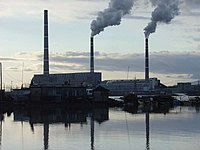
Photo from wikipedia
To analyze the impact of government carbon tax and subsidy policies on the manufac turing industry in the context of carbon peaking and carbon neutrality. This paper constructs a game… Click to show full abstract
To analyze the impact of government carbon tax and subsidy policies on the manufac turing industry in the context of carbon peaking and carbon neutrality. This paper constructs a game model based on two government policies: a “carbon tax” policy for the original product and a “subsidy” policy for the remanufactured product, taking the original product and the remanufactured product as the objects. The policy game model is used to study the impact of carbon taxes, government subsidies, and carbon emissions on product quality, sales, and corporate profits. The results show that under the carbon tax and government subsidy policies, the price of remanufactured products will decrease, the quality will increase, sales will improve, and remanufacturers’ profits will increase; these outcomes are conducive to the development of remanufacturing enterprises. Meanwhile, the price of original products will increase, quality will decrease, sales will decline, and original equipment manufacturers will have to develop and adopt low-carbon technologies to achieve sustainable development. This paper provides decision support for the formulation of government carbon emission policy, and theories and methods for the sustainable development of the manufacturing industry.
Journal Title: International Journal of Environmental Research and Public Health
Year Published: 2022
Link to full text (if available)
Share on Social Media: Sign Up to like & get
recommendations!